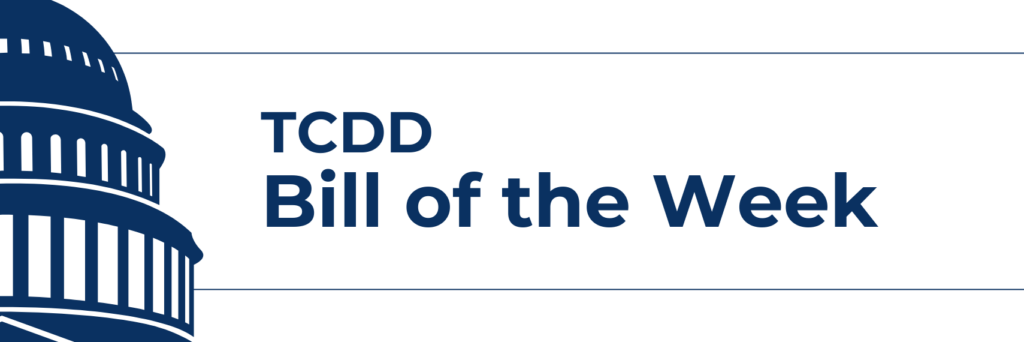
Table of Contents
For this weekly feature, the Texas Council for Developmental Disabilities (TCDD) profiles a noteworthy bill going through the legislative process. The bill may relate directly to TCDD’s Public Policy Priorities or another disability-related issue.
Bill of the Week: SB 1952
Senate Bill (SB) 1952, relating to the administration and operation of the School Health and Related Services (SHARS) program. SB 1952 was authored by Sen. Angela Paxton from McKinney, District 8.
Share This Bill
We’ve created a Bill of the Week one-pager (PDF) for SB 1952. This is a simplified explanation of the bill that you can share with your representative and personal network.
Background
Across Texas, many students with disabilities receive health-related services during the school day that are necessary for them to access their education. These services — which may include speech therapy, physical therapy, nursing services, counseling, and more — are often provided through the SHARS program. SHARS is a Medicaid program that allows public school districts and open-enrollment charter schools to receive federal reimbursement for certain services provided to Medicaid-eligible students with disabilities. These students must meet the requirements for special education under the Individuals with Disabilities Education Act.
The administration of SHARS has historically involved multiple state agencies and a complicated set of federal and state regulations. Local education agencies and schools participating in the program have had challenges navigating regulatory requirements, training, and guidance on how to properly manage the program and submit claims for reimbursement. Additionally, responsibilities for the SHARS program have not always been clearly divided between the Health and Human Services Commission (HHSC) and the Texas Education Agency (TEA). This has created confusion for schools and families.
A 2017 federal audit (PDF, 37 pages, 452 KB) concluded that Texas was improperly billing for services not covered by SHARS. After this finding, the federal government required Texas to return $19 million that had been provided under the program. This led HHSC to use stricter criteria in its approval of SHARS billing, which resulted in a clawback of over $607 million per year from schools and a massive gap in special education resources.
It has been suggested that the issue would be alleviated by having more centralized, coordinated oversight for the SHARS program.
What does the bill do?
SB 1952 would amend the Texas Government Code to establish HHSC as the sole state agency responsible for administering the SHARS program. The bill indicates this change to be in accordance with current statute, which names HHSC as the state agency that administers federal Medicaid funds.
The bill requires HHSC to oversee the participation of local education agencies as providers in the SHARS program. This includes training providers and supplying information and guidance about the program to those providers. HHSC would also be required to collaborate with regional education service centers to provide resources, information, and other appropriate assistance to local education agencies that participate or are interested in the program.
SB 1952 directs HHSC and TEA to enter into a memorandum of understanding that specifically identifies the responsibilities of each agency with respect to operating the SHARS program.
The terms “local education agency” and “regional education service center” are defined in the bill.
If passed into law, SB 1952 would take effect Sept. 1, 2025, or immediately if approved by a two-thirds majority in the House and Senate. The bill requires a waiver or authorization to be requested if HHSC or another state agency determines that a federal agency waiver is necessary to implement the bill. It allows the delay of implementation until the request is granted.

“SB 1952 is a critical step to protect and strengthen the services our schools provide to students with special needs. By designating the Health and Human Services Commission as the sole administrator of the SHARS program, we are ensuring greater accountability, compliance with federal guidelines, and improved access to essential Medicaid reimbursements for school-based health services. This legislation helps safeguard vital funding and ensures that resources reach the students who need them most.”
Sen. Angela Paxton, SB 1952 author
Where is the bill in the process?
SB 1952 was passed by the Senate on April 24 and by the House on May 21. It now heads to the governor for signature into law.
The bill received a public hearing before the Senate Health and Human Services Committee on April 15. You can watch the discussion on it here, beginning at the 0:11:39 mark.
The bill received a public hearing before the House Human Services Committee on May 6. You can watch the discussion on it here, beginning at the 0:18:44 mark.
Who testified on the bill and why?
The following comments were provided at the April 15 hearing on SB 1952:
- Disability Rights Texas: Steven Aleman, senior policy specialist for Disability Rights Texas, testified on the bill. He emphasized the need to focus on the impacts on students that have resulted from the federal findings. He stated: “It is important that students with disabilities receive all services, including medically necessary services, during the school day,” and suggested that SB 1952 represents an important opportunity for that to continue. However, he noted HHSC’s lack of expertise on students with disabilities and special education settings, and requested that the bill be updated to provide more detail on the delegation of duties to TEA. He concluded his remarks by saying: “It’s clear that HHSC does need to be the lead organization in this program, but the partnership with TEA is critical, and we believe there needs to be more guidance and clarity in the legislation in directing the development of the MOU.”
Who supports the bill and why?
The National Alliance on Mental Illness (NAMI) Texas and Texas PTA registered their support for the bill at its May 6 hearing but provided no testimony.
Who opposes the bill and why?
The following comments were provided at the April 15 hearing on SB 1952:
- Texas State Billing Services: Robert Ewen with the Texas State Billing Services testified in opposition to the bill. He explained that his company is a SHARS billing vendor that works with about 150 school districts of various sizes. Ewen suggested that a great deal of the reason for the federal government’s clawback of SHARS funds in Texas was due to mismanagement by HHSC. Ewen suggested that HHSC’s response to the federal action was to overcorrect, not follow guidance from the Centers for Medicare and Medicaid Services, and ultimately hurt school districts even more. He also questioned who would be providing expertise on the educational system if HHSC was the sole administrator for SHARS. In closing, Ewen stated: “What we want is for HHSC to work more with TEA and the school districts and the experts in this field to ensure that the program is being run properly and school districts are getting everything that they are actually entitled to.”
How much will the bill cost?
The Legislative Budget Board (PDF) found that SB 1952 would not impact the state budget in a significant way.
Is there a House companion to the bill?
There is no House companion to SB 1952.
Stay Informed
For the latest information about where SB 1952 is in the process, follow the bill on the Texas Legislature Online. To receive future legislative updates from TCDD, follow us on Facebook, X, Instagram, and LinkedIn.
Bill of the Week Updates
Here is an update on previous TCDD Bills of the Week for the 89th legislative session.
House Bill (HB) 2310, which would require the development of a four-year strategic plan to improve access to child care and early childhood education for children with disabilities, has been favorably reported by the Senate Education K-16 Committee. It now awaits scheduling for consideration by the full Texas Senate.
SB 57 has been scheduled for consideration by the full House on May 24. The bill would ensure public schools have safety plans and accommodations for students with disabilities during safety drills, disasters, or emergencies.
SB 568 has been favorably reported by the House Public Education Committee. The bill, which would restructure funding for special education programs in public schools, now awaits scheduling for consideration by the full Texas House.
SB 1447, which directs TEA to adopt standards relating to the use of assistive technology as needed for individualized special education programs and 504 plans, has been favorably reported by the House Public Education Committee. It now awaits scheduling for consideration by the full body.
